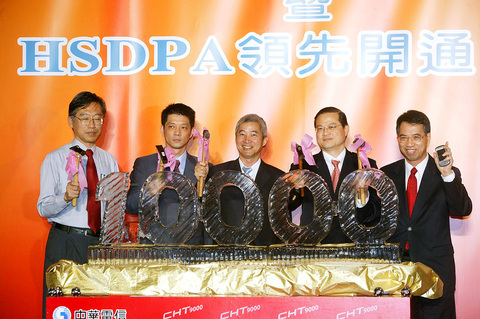Chunghwa Telecom Co (中華電信), the country's biggest telecommunications operator, yesterday confirmed that it had signed a letter of intent with Hong-Kong-based PCCW Ltd (電訊盈科) to source more content for its Internet protocol television (IPTV) subscribers.
The cooperation would help Chunghwa Telecom improve its content and thereby expand its customer base.
"We signed a letter of intent with PCCW, but it will take some time for us to fulfill the agreement," Chung-hwa Telecom chairman Hochen Tan (賀陳旦) told reporters on the sidelines of a press conference in Taipei to launch the company's high-speed downlink packet access (HSDPA) service.

PHOTO: WANG YI-HUNG, TAIPEI TIMES
The HSDPA, also known as 3.5G, offers data transmission speeds up to 10 times faster than current third-generation (3G) service.
Hochen said the two companies agreed to introduce more contents through different means, including setting up a joint venture, or cooperating in channel sourcing to enhance their bargaining power and enlarge their scale.
Chunghwa Telecom has signed up about 100,000 IPTV subscribers since it launched the paid-TV service in 2004 and expects this figure to rise to about 300,000 users by the end of the year. The company offers 33 channels more than 1,600 paid programs.
PCCW, which offers IPTV over its Network of the World (NOW) broadband television infrastructure, has more than 500,000 users and exclusive rights to air HBO, ESPN and other international channels in Hong Kong.
Separately, Hochen also said that Chunghwa Telecom was in talks with Research in Motion (RIM) to launch Blackberry mobile phones in the country, following in the foot-steps of its smaller rival Taiwan Mobile Co (
Taiwan Mobile, the nation's third-largest mobile carrier, said it plans to offer BlackBerry phones as early as the end of this month, which would make it the first wireless service provider in the country to launch the red-hot mobile device.
"We will make every effort to seek a chance to cooperate with RIM before year's end," he said.

Nvidia Corp CEO Jensen Huang (黃仁勳) today announced that his company has selected "Beitou Shilin" in Taipei for its new Taiwan office, called Nvidia Constellation, putting an end to months of speculation. Industry sources have said that the tech giant has been eyeing the Beitou Shilin Science Park as the site of its new overseas headquarters, and speculated that the new headquarters would be built on two plots of land designated as "T17" and "T18," which span 3.89 hectares in the park. "I think it's time for us to reveal one of the largest products we've ever built," Huang said near the

China yesterday announced anti-dumping duties as high as 74.9 percent on imports of polyoxymethylene (POM) copolymers, a type of engineering plastic, from Taiwan, the US, the EU and Japan. The Chinese Ministry of Commerce’s findings conclude a probe launched in May last year, shortly after the US sharply increased tariffs on Chinese electric vehicles, computer chips and other imports. POM copolymers can partially replace metals such as copper and zinc, and have various applications, including in auto parts, electronics and medical equipment, the Chinese ministry has said. In January, it said initial investigations had determined that dumping was taking place, and implemented preliminary

Intel Corp yesterday reinforced its determination to strengthen its partnerships with Taiwan’s ecosystem partners including original-electronic-manufacturing (OEM) companies such as Hon Hai Precision Industry Co (鴻海精密) and chipmaker United Microelectronics Corp (UMC, 聯電). “Tonight marks a new beginning. We renew our new partnership with Taiwan ecosystem,” Intel new chief executive officer Tan Lip-bu (陳立武) said at a dinner with representatives from the company’s local partners, celebrating the 40th anniversary of the US chip giant’s presence in Taiwan. Tan took the reins at Intel six weeks ago aiming to reform the chipmaker and revive its past glory. This is the first time Tan

CUSTOMERS’ BURDEN: TSMC already has operations in the US and is a foundry, so any tariff increase would mostly affect US customers, not the company, the minister said Taiwanese manufacturers are “not afraid” of US tariffs, but are concerned about being affected more heavily than regional economic competitors Japan and South Korea, Minister of Economic Affairs J.W. Kuo (郭智輝) said. “Taiwan has many advantages that other countries do not have, the most notable of which is its semiconductor ecosystem,” Kuo said. The US “must rely on Taiwan” to boost its microchip manufacturing capacities, Kuo said in an interview ahead of his one-year anniversary in office tomorrow. Taiwan has submitted a position paper under Section 232 of the US Trade Expansion Act to explain the “complementary relationship” between Taiwan and the US